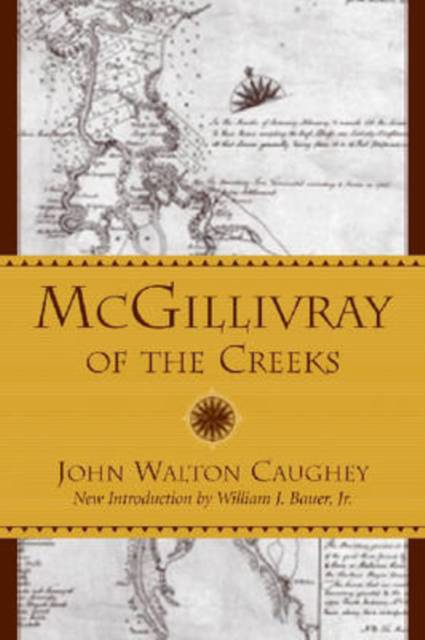
- Afhalen na 1 uur in een winkel met voorraad
- Gratis thuislevering in België vanaf € 30
- Ruim aanbod met 7 miljoen producten
- Afhalen na 1 uur in een winkel met voorraad
- Gratis thuislevering in België vanaf € 30
- Ruim aanbod met 7 miljoen producten
Zoeken
€ 20,95
+ 41 punten
Omschrijving
First published in 1939, McGillivray of the Creeks is a unique mix of primary and secondary sources for the study of American Indian history in the Southeast. The historian John Walton Caughey's brief but definitive biography of Creek leader Alexander McGillivray (1750-1793) is coupled with 214 letters between McGillivray and Spanish and American political officials. The volume offers distinctive firsthand insights into Creek and Euroamerican diplomacy in Georgia, Alabama, and Mississippi in the aftermath of the American Revolution as well as a glimpse into how historians have viewed the controversial Creek leader. McGillivray, the son of a famous Scottish Indian trader and a Muskogee Creek woman, was educated in Charleston, South Carolina, and, with his father's guidance, took up the mantle of negotiator for the Creek people during and after the Revolution. While much of eighteenth-century American Indian history relies on accounts written by non-Indians, the letters reprinted in this volume provide a valuable Indian perspective into Creek diplomatic negotiations with the Americans and the Spanish in the American South. Crafty and literate, McGillivray's letters reveal his willingness to play American and Spanish interests against one another. Whether he was motivated solely by a devotion to his native people or by the advancement of his own ambitions is the subject of much historical debate.
Specificaties
Betrokkenen
- Auteur(s):
- Uitgeverij:
Inhoud
- Aantal bladzijden:
- 389
- Taal:
- Engels
- Reeks:
Eigenschappen
- Productcode (EAN):
- 9781570036927
- Verschijningsdatum:
- 1/05/2007
- Uitvoering:
- Paperback
- Formaat:
- Trade paperback (VS)
- Afmetingen:
- 153 mm x 226 mm
- Gewicht:
- 553 g

Alleen bij Standaard Boekhandel
+ 41 punten op je klantenkaart van Standaard Boekhandel
Beoordelingen
We publiceren alleen reviews die voldoen aan de voorwaarden voor reviews. Bekijk onze voorwaarden voor reviews.








